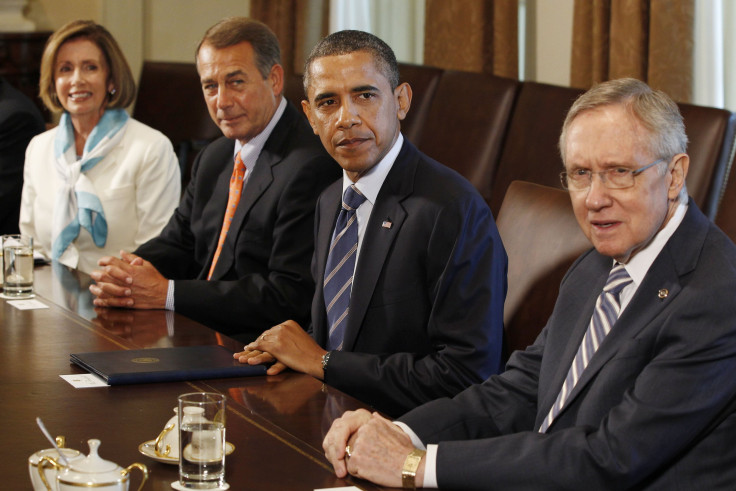Budget Battles: A Familiar Dance By Democrats, Republicans That May Amount To Nothing

With the unveiling of House Budget Committee Chairman Paul Ryan’s budget blueprint on Tuesday and the Democrats’ version coming this week, it appears the wheels of Congress have begun turning. But the machine could stop soon.
Releasing budget blueprints is something both parties do each year. They should be starting points for negotiation, but the vast differences between the parties are very evident in their approaches to charting a clear path forward for the government's finances.
On the one side, Democrats are proposing a $1.85 trillion package split between tax increases and spending cuts, including to health care and defense. On the other are the Republicans, who propose to balance the budget in 10 years while cutting tax rates, with much deeper spending cuts. The GOP’s plan would keep the entire next decade of savings from cuts specified under the Budget Control Act of 2011. Republicans would also keep the $1.2 trillion from the sequester, the $600 billion in tax revenue from the recent fiscal cliff deal and the $716 billion in savings from Medicare under the Affordable Care Act, also known as Obamacare.
But Rep. Ryan, R-Wis., doesn’t stop there. Going a step further, he would repeal Obamacare, saving $1.8 trillion by his reckoning, and make cuts to Medicare and Medicaid, with the latter turning into a block grant program giving states more flexibility.
But he has no chance of seeing his budget pass the Democratic-led Senate.
“I don’t think it is a sign of a thaw. I would hope there is a thaw,” said Scott Lilly, a senior fellow at the Center for American Progress. “The extreme nature of Ryan’s budget is a discouraging sign of the two parties getting together.”
Ryan’s budget contains several points that were hot issues during the 2012 campaign, when he was the vice presidential nominee. The safety net for the poor would be weakened, at the least, and many senior citizens will oppose the transformation of Medicare into a voucher system.
“Instead of coming to the center, the Republicans are moving further and further to the right,” Lilly said.
And if Ryan rules out the revenue side of a solution but remains focused on gutting programs like Medicare and Medicaid, then, President Barack Obama said, “We’re probably not going to be able to get a deal.”
The near-term economic outlook, however, is good, according to the nonpartisan Congressional Budget Office. The CBO’s baseline projection is that the deficit will continue to shrink over the next few years, to 2.4 percent of GDP in 2015.
It is later in the decade that the deficit will pose a problem, when it increases because of an aging population. A rapidly increasing number of elderly is expected to send health care costs up. There will be an expansion of the federal subsidies for health insurance and increased interest payments on the federal debt, the CBO stated. That will add to the existing national debt.
“As a result, federal debt held by the public is projected to remain historically high relative to the size of the economy for the next decade,” according to the CBO.
Some experts are saying it is hard to take the Republicans’ budget seriously.
In his analysis of Ryan’s budget, Robert Greenstein, president of the Center on Budget and Policy Priorities, said the plan doesn’t specify “hundreds of billions of dollars in budget cuts, as well as the several trillion dollars of needed tax expenditure savings to pay for its proposed deep cuts in income tax rates.”
He added that the claims in Ryan’s proposal “rest on massive magic asterisks.”
“What stands out, above all else, is Chairman Ryan’s unwillingness to propose anything that would upset his party’s base of supporters or, in particular, its ideological opposition to any revenue increases,” Greenstein wrote in his statement. “Paul Ryan is a smart and engaging individual. But make no mistake: His budget is extreme. And in its reverse Robin Hood policies, its ideological rigidity and its calculated vagueness, it sadly reflects some of the worst features of American politics at this crucial time.”
“The elimination of Medicare is not a viable solution in this. I’m not saying we can’t touch Medicare, just don’t eliminate it,” Lilly said. “The irony of all of this the people [the Republicans] are attacking is the majority who voted for them.”
© Copyright IBTimes 2025. All rights reserved.






















